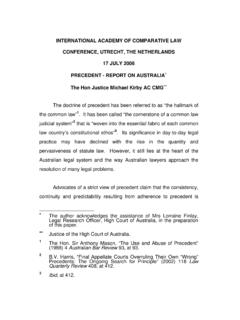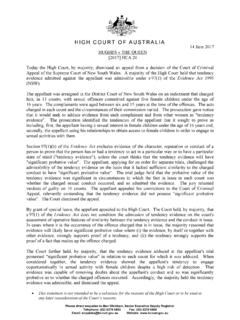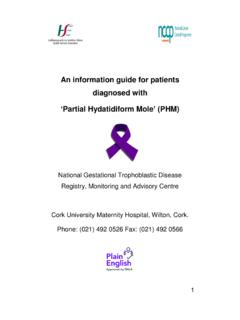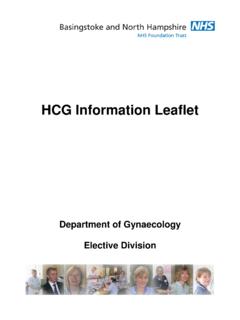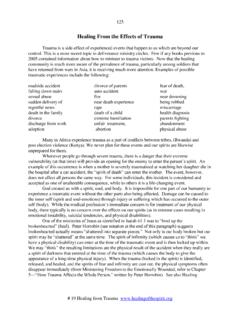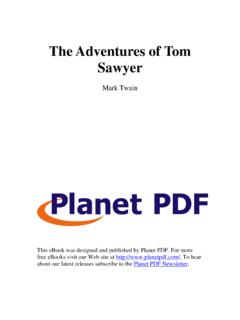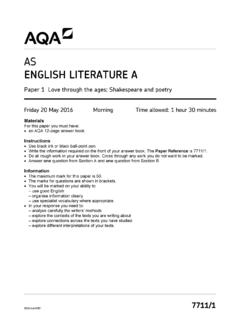Transcription of HIGH COURT OF AUSTRALIA
1 H I G H C O U R T O F A U S T R A L I A Please direct enquiries to Ben Wickham, Senior Executive Deputy Registrar Telephone: (02) 6270 6893 Email: Website: IMM v THE QUEEN [2016] HCA 14 Today the high COURT unanimously allowed an appeal from a decision of the COURT of Criminal Appeal of the Northern Territory. The COURT held, by majority, that in determining the probative value of evidence for the purposes of ss 97(1)(b) and 137 of the Evidence (National Uniform Legislation) Act (NT) ("the Evidence Act"), a trial judge should assume that the jury will accept the evidence and, thus, should not have regard to the credibility or the reliability of the evidence. The appellant was convicted by a jury in the Supreme COURT of the Northern Territory of two counts of indecent dealing with a child and one count of sexual intercourse with a child under the age of 16 years. The complainant was the appellant's step-granddaughter.
2 The prosecution was permitted to adduce "tendency evidence", given by the complainant, that while the complainant and another girl were giving the appellant a back massage, the appellant ran his hand up the complainant's leg. Section 97(1)(b) of the Evidence Act provides that evidence that has "significant probative value" be excepted from the "tendency rule", which would otherwise render the evidence inadmissible. The prosecution was also permitted to adduce "complaint evidence", which was evidence of complaints made by the complainant to other persons concerning the appellant's conduct. The trial judge refused to exclude the complaint evidence under s 137 of the Evidence Act, which provides that evidence must be excluded where its probative value is outweighed by the danger of unfair prejudice to the defendant. The trial judge approached the task of assessing the probative value of both the tendency evidence and the complaint evidence on the assumption that the jury would accept the evidence.
3 The appellant appealed against his conviction to the COURT of Criminal Appeal contending, relevantly, that the trial judge erred in admitting the tendency evidence and the complaint evidence. The COURT of Criminal Appeal unanimously dismissed the appeal. By grant of special leave, the appellant appealed to the high COURT . The high COURT held, by majority, that, in determining the "probative value" of evidence under the Evidence Act, a trial judge must proceed on the assumption that the jury will accept the evidence, and as such it follows that no question as to credibility or reliability of the evidence can arise. The high COURT held, by majority, that the probative value of the complaint evidence was potentially significant. Further, the evidence did not create the prejudice to which s 137 of the Evidence Act referred, and as such the evidence was admissible. However the COURT also held, by majority, that evidence from a complainant adduced to show an accused's sexual interest can generally have limited, if any, probative value.
4 Accordingly, the tendency evidence was not admissible under s 97(1)(b). It followed that the trial miscarried. The COURT set aside the order of the COURT of Criminal Appeal and ordered that the appeal be allowed, that the appellant's conviction be quashed and that there be a new trial of the offences of which the appellant was convicted. This statement is not intended to be a substitute for the reasons of the high COURT or to be used in any later consideration of the COURT s reasons. 14 April 2016
